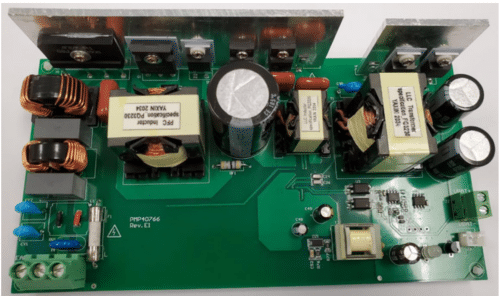The charger, a 500-watt design for e-bikes, offers a 71.4V, 7A output with 95.8% efficiency and an adjustable CC/CV feature, suitable for various charging requirements.

The 500-watt Constant Current/Constant Voltage (CC/CV) charger is vital for electric bikes (e-bikes), offering a blend of efficiency, safety, and compatibility. These chargers ensure optimal performance and prolonged battery life and are designed to match the specific power requirements of e-bike batteries. They are crucial for providing rapid and efficient charging, daily commuting, and longer journeys. Moreover, their ability to regulate voltage and current during charging enhances safety, reducing the risks of overcharging and associated hazards. Additionally, these chargers’ energy efficiency and versatility make them a preferred choice for e-bike users, contributing to both convenience and environmental sustainability. Overall, a 500-W CC/CV charger plays an essential role in maintaining the health and longevity of e-bike batteries, making it an indispensable tool in electric biking.
The PMP40766, 500-W CC/CV e-Bike charger reference design from Texas Instruments (TI) presents a universal input, 71.4-Volt, 7-Ampere CC/CV (Constant Current/Constant Voltage) charger tailored for e-bike applications. It incorporates the UCC28180 for the Continuous Conduction Mode (CCM) Power Factor Correction (PFC) stage, ensuring a high power factor of 0.99 and minimizing current total harmonic distortion. The charger also features the UCC256403 for its half-bridge resonant converter, which achieves an impressive 95.8% efficiency and rapid load response in constant voltage mode. A flyback configuration using the UCC28910 is employed to supply auxiliary power to the PFC, LLC (inductor-inductor-capacitor), control circuits, and cooling fans. Notably, the design includes an adjustable CC/CV setting controlled by the MCU board, enhancing its suitability for charging applications involving multiple-cell batteries.
The charger boasts several notable features, including a 0.99 power factor at full load output, ensuring efficient power usage. Its peak efficiency reaches an impressive 95.8%, highlighting its effectiveness in energy conversion. Additionally, it includes a charging status indication for user convenience and monitoring. A significant aspect of its design is the reserved digital option for adjustable CC/CV, providing flexibility in adapting to various charging needs.
The design parameters of this system include a minimum input voltage (Vin) of 90 Volts and a maximum of 264 Volts, catering to a wide range of power supplies. It delivers a nominal output voltage (Vout) of 390 Volts with a maximum output current (Iout) of 1.33 Amperes. The total output power capability of the system is 518.7 Watts. It is a non-isolated system, indicating direct electrical connectivity between the input and output. The input type is AC, and the design incorporates a Boost-Power Factor Correction (Boost-PFC) topology, enhancing power conversion efficiency.
TI has tested this reference design. It comes with a Bill of Material (BOM), schematics, etc. You can find additional data about the reference design on the company’s website. To read more about this reference design, click here.








